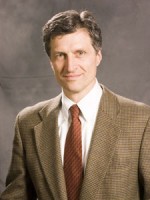Column Name
Title
Composers don’t exactly have it easy. On top of carving out time to write music, they also devote considerable effort to getting their works played and heard … not to mention pursuing other activities that pay the bills. Some juggle composing with teaching or performing; others might take on unrelated jobs that are the actor’s equivalent of waiting tables. But rarely does someone graduate from Juilliard debating whether to be a composer or a doctor—and decide to do both.
Body
Scott Steidl (M.M. ’81, D.M.A. ’85, composition) is an eye surgeon who also happens to be a Juilliard-trained composer. His dual careers (not in succession, mind you, but pursued simultaneously) are unusual, but not exactly unpredictable; his father was a physician and his mother taught music at a college. “There were times when I almost felt my dad was trying to talk me out of going into medicine,” Steidl laughs. “He wanted to make sure I found the right niche for myself and didn’t just follow in his footsteps.” But he saw that his father’s experience was stimulating and satisfying; being a doctor “wasn’t a job that got old quickly; there was constant relearning and reinventing yourself and trying to keep on top of all these things going on in science. And that appealed to me.”
But so did music. Growing up in Minneapolis, Steidl studied several instruments, was interested in jazz, played in both a rock band and an orchestra—“a generic, eclectic background encompassing all the influences a lot of American composers describe,” he notes. Intending to focus on pre-med studies at Brown University, Steidl actually earned two degrees, one in biochemistry and one in music, through a five-year curriculum.
The vitality of New York (experienced during a semester off from Brown, during which he took classes through Juilliard’s Extension Division) and the warning of Brown’s dean of pre-med admissions (“If you want a life, don’t go into medicine”) convinced Steidl that the myopia of medical school could wait while he plunged full-time into music at Juilliard. There, he found an “astonishing collection” of faculty composers that included Roger Sessions, Peter Mennin (then president of the School), Milton Babbitt, Elliott Carter, Vincent Persichetti, and David Diamond. Steidl, now 51, also met his wife, Mary Duncan, a student in the Dance Division, when they collaborated on a Choreographers and Composers project.
Though he received a number of awards and his works were being performed to encouraging reviews (The New York Times praised a concert of his music at Merkin Hall), the unpredictability of a composer’s life prompted Steidl to enter Mount Sinai School of Medicine just as a playwright friend from Brown made a similar decision. “I wondered,” he says, “why couldn’t I just keep my music going without having to make it my occupation, avocation, everything all in one?”
After a residency at St. Vincent’s Medical Center in Manhattan and a fellowship at the Harvard Medical School’s Massachusetts Eye and Ear Infirmary in Boston, Steidl wound up directing the division of retina surgery in the ophthalmology department at the University of Maryland School of Medicine in Baltimore for 12 years. He has four books in the field of ophthalmology to his credit—as well as a CD of his music, performed by the New Zealand Symphony Orchestra and conducted by James Sedares, released by Albany Records in 2001.
Seeking a new balance in his life and wanting to spend more time with his two children, ages 9 and 13, Steidl accepted a position about a year ago as one of six doctors at an ophthalmology group in Portland, Me., and moved his family to a house within a block of the ocean. His new position at the well-staffed center “allows me not to have to worry about anything other than being a doctor”—and, once he and his family are settled in, there will be more time for music. Steidl (whose commissions include works for the Long Beach Symphony, the El Paso Pro-Musica, and the Robin Becker Dance Company) said he would like to explore digital recording technology—and perhaps collaborate again with his wife, a freelance opera director who has worked in Aspen.
Current students, he says, shouldn’t “sell themselves short on any level. Success in artistic careers can be a pretty fickle thing—based on personality, circumstances, injuries, who knows what. It’s critical that people not feel like they’ve put all their eggs in one basket. There are a lot of things that can complement what they do—and a lot of alternatives for people if they start to grow away from it. There’s nothing wrong with making a life change, if that’s what you want to do. But remember that, when you feel kind of narrow, you can expand without necessarily turning your back on something.”





